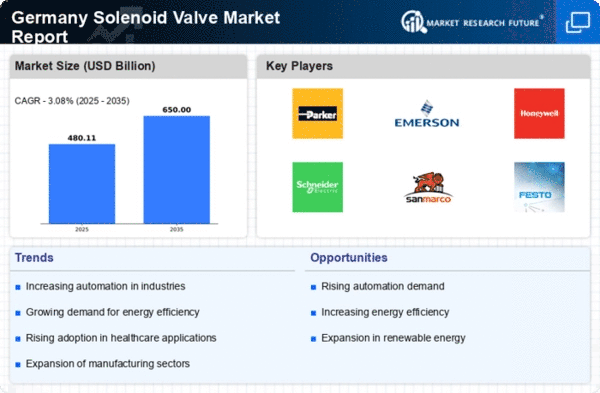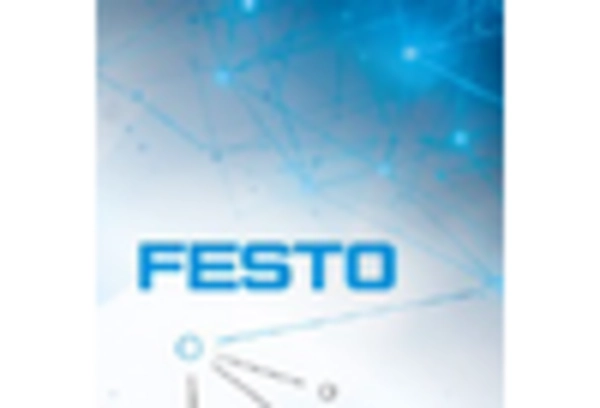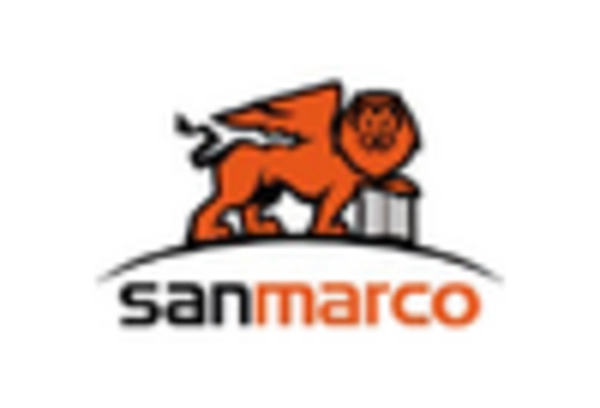Growth in Renewable Energy Sector
The expansion of the renewable energy sector in Germany is significantly impacting the solenoid valve market. As the country transitions towards sustainable energy sources, the demand for efficient fluid control systems in wind and solar energy applications is rising. Solenoid valves are essential in managing the flow of fluids in various renewable energy systems, including hydraulic systems in wind turbines and cooling systems in solar panels. This growing sector is projected to drive a market increase of approximately 5% annually, as companies invest in technologies that support the shift towards greener energy solutions. The alignment of solenoid valve applications with renewable energy initiatives underscores their importance in achieving national energy goals.
Rising Automation in Manufacturing
The solenoid valve market in Germany is experiencing a notable surge due to the increasing automation in manufacturing processes. Industries are adopting automated systems to enhance efficiency and reduce operational costs. This trend is particularly evident in sectors such as automotive and pharmaceuticals, where precision and reliability are paramount. The integration of solenoid valves in automated machinery allows for precise control of fluid and gas flow, which is essential for maintaining optimal production conditions. As a result, the demand for solenoid valves is projected to grow, with estimates suggesting a compound annual growth rate (CAGR) of around 5% over the next few years. This growth is indicative of the broader shift towards Industry 4.0, where smart manufacturing practices are becoming the norm.
Environmental Regulations and Compliance
In Germany, stringent environmental regulations are driving the solenoid valve market as industries seek to comply with laws aimed at reducing emissions and conserving resources. The European Union's directives on environmental sustainability compel manufacturers to adopt technologies that minimize waste and enhance energy efficiency. Solenoid valves play a crucial role in this transition by enabling better control of fluid systems, thereby reducing leaks and improving overall system efficiency. The market is likely to see an increase in demand for eco-friendly solenoid valves, which are designed to meet these regulatory standards. This shift not only aligns with governmental policies but also reflects a growing consumer preference for sustainable practices, potentially leading to a market growth of approximately 4% annually.
Technological Advancements in Valve Design
The solenoid valve market is benefiting from continuous technological advancements in valve design and materials. Innovations such as the development of corrosion-resistant materials and enhanced electromagnetic designs are improving the performance and longevity of solenoid valves. These advancements are particularly relevant in industries like chemical processing and water treatment, where durability and reliability are critical. The introduction of smart solenoid valves, which can be monitored and controlled remotely, is also gaining traction. This trend is expected to contribute to a market growth rate of around 6% in the coming years, as industries increasingly prioritize advanced solutions that offer better performance and integration capabilities.
Increased Investment in Infrastructure Development
Germany's ongoing investment in infrastructure development is creating a favorable environment for the solenoid valve market. The government is focusing on modernizing transportation, water supply, and waste management systems, which necessitates the use of advanced fluid control technologies. Solenoid valves are integral to these systems, ensuring efficient operation and maintenance. The infrastructure projects, supported by both public and private funding, are expected to boost the demand for solenoid valves, with projections indicating a growth rate of around 4% over the next few years. This trend reflects a broader commitment to enhancing the country's infrastructure, which is likely to sustain the market's expansion.

















